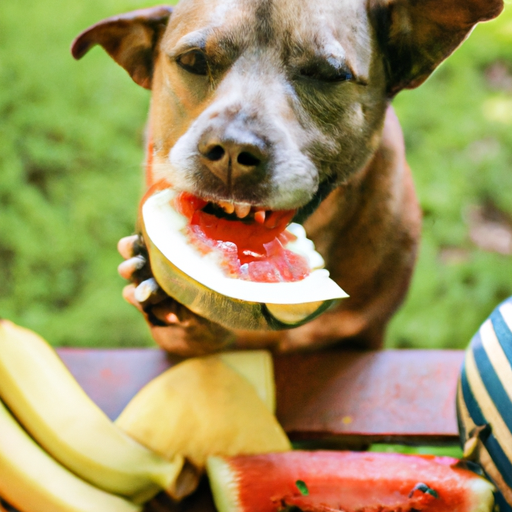Being a caregiver to a furry friend is a rewarding, yet challenging, responsibility. Giving them the right diet is one of the crucial aspects that require your attention. So, let’s take a deep dive into the world of fruits that are safe for your canine companions.
1. Apples
Apples are a great source of Vitamin A and C, as well as fiber for your dog. They are low in fat and protein, which makes them an ideal snack for elderly dogs. However, beware of the apple seeds and core, they contain cyanide and can be harmful to dogs.
- Benefits: High in vitamins and fiber, low in fat and protein.
- Caution: Remove seeds and core.
2. Bananas
Bananas are high in potassium, vitamins, biotin, fiber, and copper. They are low in cholesterol and sodium, but due to their high sugar content, they should only be given as a treat, not a part of their regular diet.
- Benefits: High in potassium, vitamins, and fiber.
- Caution: High in sugar, feed in moderation.
3. Blueberries
Blueberries are a superfood packed with antioxidants, fiber and vitamins C and K. They are beneficial for dog’s cardiovascular and brain health. They’re also a great low-calorie treat option.
- Benefits: Packed with antioxidants, fiber, and vitamins.
- Caution: None, but feed in moderation.
4. Oranges
Oranges are safe for dogs to eat, but due to their high sugar content, they should be given in moderation. They are a good source of vitamin C, potassium, and fiber.
- Benefits: High in vitamin C, potassium, and fiber.
- Caution: High in sugar, feed in moderation.
5. Watermelon
Watermelon is hydrating and low in calories, making it a refreshing treat. It’s packed with vitamins A, B6, C, and potassium. Note that seeds and rind can cause intestinal blockage, so they should be removed before feeding to your dog.
- Benefits: Hydrating, low in calories, high in vitamins.
- Caution: Remove seeds and rind.
Here is a table summarizing the nutritional benefits and cautions for each fruit:
| Fruit | Benefits | Caution |
|---|---|---|
| Apple | High in vitamins and fiber, low in fat and protein | Remove seeds and core |
| Banana | High in potassium, vitamins, and fiber | High in sugar, feed in moderation |
| Blueberry | Packed with antioxidants, fiber, and vitamins | Feed in moderation |
| Orange | High in vitamin C, potassium, and fiber | High in sugar, feed in moderation |
| Watermelon | Hydrating, low in calories, high in vitamins | Remove seeds and rind |
FAQ
Q: Can dogs eat grapes?
A: No, grapes are highly toxic to dogs.
Q: How much fruit can I give my dog?
A: Fruits should only make up about 10% of your dog’s diet.
Q: Are there any other fruits dogs can eat?
A: Yes, dogs can also eat pears, peaches, and strawberries, among others. Always research before introducing a new fruit.
Q: Can dogs eat fruit every day?
A: While fruits are healthy, they should be given in moderation due to their sugar content.
Remember, while fruits are a healthy treat option for dogs, they should be given in moderation and should not constitute a significant part of their diet. Always consult with your vet before introducing a new food into your dog’s diet.



